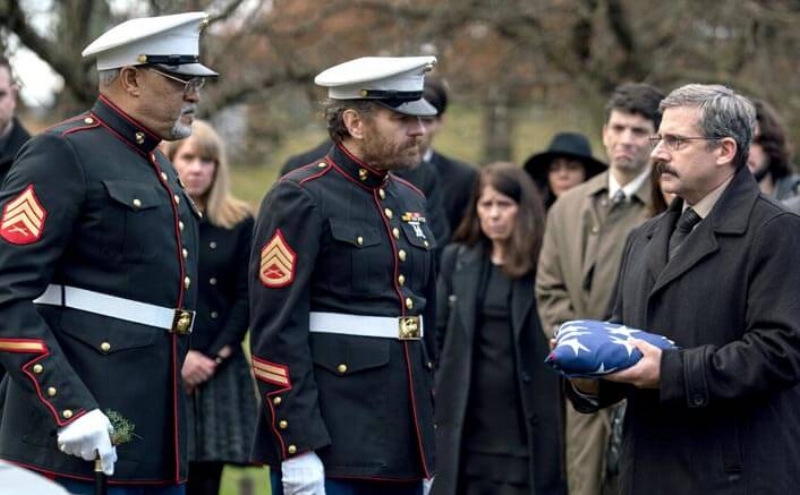THREE BILLBOARDS OUTSIDE EBBING, MISSOURI
Directing: B+
Acting: A-
Writing: B
Cinematography: B
Editing: A-
There's a lot to love in Three Billboards Outside Ebbing, Missouri. Sometimes, however, a movie is really good, yet not quite as great as great as the critical consensus might have you believe. My response to this film was indeed generally very positive, but still a bit more tempered than some who heap praise upon it. I'm not sure how many people quite see its subtle, perhaps even minor, element of tone deafness.
It's easy to go back and forth on this, and the cynic in me is tempted to say writer-director Martin McDonagh -- who gave us two superior films in both In Bruges (2008) and Seven Psychopaths (2012) -- is being deliberate about that. Observed with a minimum of thoughtfulness, this is a movie that could entertain both the so-called liberal "snowflakes" and those who would call them that. The thing is, those previous films were characterized by comic violence and drawing attention to the nature of storytelling itself. Three Billboards attempts to take a point of view rooted in a realism of the American south, and I'm not sure the British McDonagh knows quite enough about that to pull off the many layers attempted here. How does this play to audiences of people who actually live in Missouri, I wonder? That's a compelling question regardless of political leanings.
I'm just not sure the timing is quite right for yet another movie featuring cultural racists and casual misogynists who turn out deep down to have hearts of gold (spoiler alert!), even if it takes a traumatic experience to ignite a change of heart. In a weird, somewhat backward way, some of the characters in this story are the result of too much effort to make them nuanced and multi-dimensional. There are moments when it feels inauthentic, especially when a black woman who is the subject of a key subplot gets strangely little actual screen time, in favor of all the white principal characters.
So, okay: those are the complaints. Three Billboards Outside Ebbing, Missouri is imperfect in precisely disappointing ways. But imperfect is hardly the same as unworthy, and this movie is still absolutely worth the time, for both its riveting storytelling -- in spite of the aforementioned flaws -- and in particular its excellent performances. Frances McDormand's badass turn as Mildred, the mother of the slain young woman whose murder remains frustratingly unsolved many months later, is easily worthy of an Oscar nod. And the fact that this year has offered a great many great female lead performances, which actually somewhat diminishes McDormand's chances, is a good problem to have.
Woody Harrelson is Chief Willoughby, the man called out -- perhaps unfairly -- by the billboards Mildren has paid for just outside of town. Sam Rockwell is saddled with the most problematic character, Dixon, a local cop with a history of, to put it euphemistically, bias against people of color. Rockwell, long well deserving of the respect he's gained as a character actor, pulls off an impressive feat by making a character so vile ultimately sympathetic. The question remains as to whether he deserves to be, but Rockwell gives Dixon a unique set of layers.
The cast is rounded out by the likes of John Hawkes as Mildred's ex-husband; Lucas Hedges as her son; Abbie Cornish as Willoughby's wife; and Peter Dinklage as a local guy with a crush on Mildred. There is certainly no shortage of talent in this cast -- although, to be honest, it would be nice for there to be more substantive parts for women than just that of the lead character, a dynamic still far too common.
And, to be sure, Three Billboards Outside Ebbing Missouri is not for anyone easily triggered by the use of epithets, be they in reference to women, black people, gay people, or little people. This film features such language to a somewhat surprising degree for a mainstream film these days, the intent seeming to be a realistic representation of the ignorance among typical small-town Southern Americans -- particularly straight, white ones. To his credit, McDonagh at least never uses any of these words as punch lines, and only as a reflection of ignorant biases.
The story moves along in this context, and is so well paced, you barely have a chance to think about such nuances. I fear I'm making it sound like Three Billboards is not quite as good as I actually experienced it to be -- I just feel it's important to acknowledge these points. This is a small town affected by a broader culture that informs how Mildred deals with her specific situation -- which is the unsolved crime of a daughter raped and murdered less than a year before.
There is also a great deal of very effectively disseminated humor in this story, impressive in its integration into such a heavy scenario. Frances McDormand and Sam Rockwell both give uniquely tragicomic deliveries, and I laughed a lot, even if a lot of it was in uncomfortable circumstances. This is a very specific kind of comic relief, where you feel like these characters are making very bad decisions, and then the humor lets out some of the tension -- even when bad decisions, guaranteed to have somber consequences, are being carried out.
There is nothing simple about this movie. Some of its complications are unnecessary and avoidable; arguably more of them are what make it on the whole better than its shortcomings might otherwise suggest. This is a film that's not quite as good as it could be, but remains far better than most.
One of the great unsolved mysteries: why Mildred always wears this pair of coveralls.
Overall: B+










